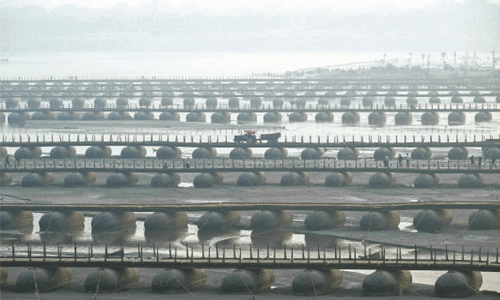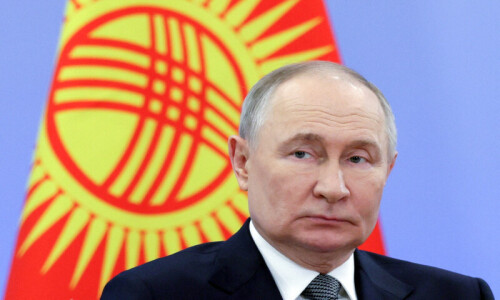ISLAMABAD: Days after the outlawed Tehreek-i-Taliban Pakistan (TTP) announced an indefinite ceasefire, the PPP held a high-level meeting to discuss the issue of terrorism and talks with the TTP brokered by Afghanistan’s Taliban administration.
The meeting, co-chaired by former president and chief of PPP Parliamentarians Asif Ali Zardari and PPP chairman and Foreign Minister Bilawal Bhutto-Zardari, agreed that all key decisions need to be taken by parliament.
In the first week of this month the banned TTP had formally announced an indefinite ceasefire with Pakistan following two days of talks with a grand tribal jirga in Kabul. The group has set a major condition of reversal of the merger of the Federally Administered Tribal Areas (Fata) with Khyber Pakhtunkhwa to cut any peace deal with Pakistan.
A participant of the PPP meeting said a candid discussion was held on militancy, with a focus on possible implications of mainstreaming the TTP without taking parliament on board.
The meeting discussed questions like purpose of the entire exercise, the forces behind it and the desired objectives.
“PPP held a high level meeting to discuss issue of terrorism. Particularly in light of recent developments in Afghanistan, with the TTA & TTP. PPP believes that all decisions must be taken by parliament. Will be reaching out to allied parties to creat consensus on the way forward”, FM Bilawal Bhutto-Zardari tweeted.
Seminar on Afghan peace
In a related development, speakers at a consultation here were of the opinion that Pakistan needs to be “assertive” and should negotiate with the TTP from a “position of strength.”
Lawmakers, academicians, former diplomats, retired army officers and experts on security and Afghan affairs participated in the discussion on ‘Afghan peace and reconciliation: Pakistan’s interests and policy options’ organised by Islamabad-based Pak Institute for Peace Studies (PIPS).
Most participants were critical of the TTP demand for reversal of Fata’s merger with KP. They said that Pakistan should only talk to the group on the terms of surrender.
The speakers had divergent views about the outcome of Pakistan’s ongoing talks with the banned group and the majority was not optimistic that Pakistan could either succeed to seal any peace deal with the TTP or any agreement would last long even if signed.
Many questioned the composition of the jirga that held talks with the group and argued that expectations of Pakistan were wrong.
Former defence secretary retired Lt Gen Naeem Khalid Lodhi opening the debate said that the option of jirga to negotiate with the militant group could work because it had the support of the government as well as the military establishment and Afghan Taliban were mediators of these talks.
He rejected the notion that the TTP and the Afghan Taliban were two sides of the same coin.
National Party president and former Balochistan chief minister Dr Abdul Malik Baloch called for adopting the policy of coexistence and urged that Pakistan would have to revisit its internal and external policies to attain peace in Balochistan and the entire country.
Former corps commander and inspector general (IG) of Frontier Corps retired Lt Gen Tariq Khan was not in favour of talks with the banned group. “If we have to talk to them, we should only negotiate on the terms of surrender,” he said.
Referring to the condition of the TTP about reversal of Fata’s merger, he showed surprise and questioned how a militant group can demand to govern a part of Pakistani territory.
Former national coordinator of the National Counter Terrorism Authority (Nacta) Ihsan Ghani was not hopeful that Pakistan would be successful in signing any peace agreement with the group. “If this happened, any such agreement would be an eyewash and short-lived.”
Senator Anwaar-ul-Haq Kakar noted that there has to be a uniform policy to end violence in the country.
Former national security adviser retired Lt Gen Nasser Khan Janjua argued that the TTP was a “defeated phenomenon.” He questioned why Pakistan has started negotiations with the group so early and put an unnecessary burden on the Afghan Taliban.
Ex-ambassador Aziz Ahmad Khan said there looked to be no chances at the moment that the Taliban would form a broad-based government in Afghanistan and offer other stakeholders to share power with them. “Pakistan needs to deal with the Afghan Taliban pragmatically.”
Former foreign secretary Inam-ul-Haq was of the view that Pakistan should recognise Afghanistan as an independent and separate country and deal with it in the same manner. He refuted the idea that Pakistan should give away a part of its territory to the TTP through any peace deal.
Former first deputy speaker of the lower house of the Afghan parliament Mirwais Yasini sought Pakistan’s support to help attain peace in his country.
Published in Dawn, June 12th, 2022















































Dear visitor, the comments section is undergoing an overhaul and will return soon.